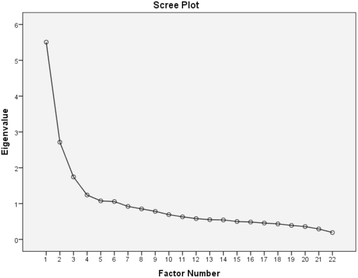The development and psychometric properties of a measure of clinicians' attitudes to depression: the revised Depression Attitude Questionnaire (R-DAQ)
- PMID: 25653089
- PMCID: PMC4321322
- DOI: 10.1186/s12888-014-0381-x
The development and psychometric properties of a measure of clinicians' attitudes to depression: the revised Depression Attitude Questionnaire (R-DAQ)
Abstract
Background: Depression is a common mental disorder associated with substantial disability. It is inadequately recognised and managed, and clinicians' attitudes to this condition and its treatment may play a part in this. Most research in this area has used the Depression Attitude Questionnaire (DAQ), but analyses have shown this measure to exhibit problems in psychometric properties and suitability for the health professionals and settings where depression recognition may occur.
Methods: We revised the DAQ using a pooled review of findings from studies using this measure, together with a Delphi study which sought the opinions of a panel of relevant experts based in the UK, USA, Australia, and European countries (n = 24) using 3 rounds of questioning to consider attitude dimensions, content, and item wording. After item generation, revision and consensus (agreement >70%) using the Delphi panel, the revised DAQ (R-DAQ) was tested with 1193 health care providers to determine its psychometric properties. Finally the test-retest reliability of the R-DAQ was examined with 38 participants.
Results: The 22-item R-DAQ scale showed good internal consistency: Cronbach's alpha coefficient was 0.84; and satisfactory test-retest reliability: intraclass correlation coefficient was 0.62 (95% C.I. 0.37 to 0.78). Exploratory factor analysis favoured a three-factor structure (professional confidence, therapeutic optimism/pessimism, and a generalist perspective), which accounted for 45.3% of the variance.
Conclusions: The R-DAQ provides a revised tool for examining clinicians' views and understanding of depression. It addresses important weaknesses in the original measure whilst retaining items and dimensions that appeared valid. This revised scale is likely to be useful in examining attitudes across the health professional workforce and beyond the confines of the UK, and may be valuable for the purpose of evaluating training that aims to address clinicians' attitudes to depression. It incorporates key dimensions of attitudes with a modest number of items making it applicable to use in busy clinical settings.
References
-
- WHO . Depression: a global public health concern. Geneva: WHO; 2012.
-
- Waraich P, Goldner EM, Somers JM, Hsu L. Prevalence and incidence studies of mood disorders: a systematic review of the literature. Can J Psychiatry. 2004;49(0706–7437; 0706–7437; 2):124–38. - PubMed
-
- World Health Organization . The global burden of disease: 2004 update. Geneva: WHO; 2008.
Publication types
MeSH terms
LinkOut - more resources
Full Text Sources
Other Literature Sources


